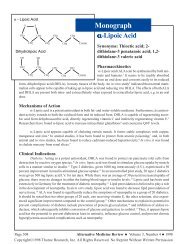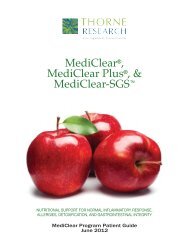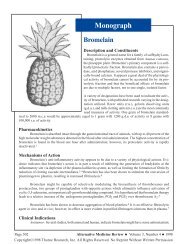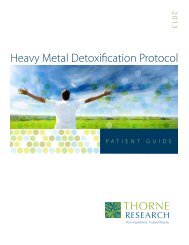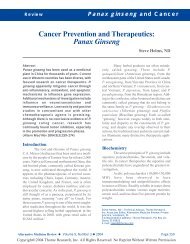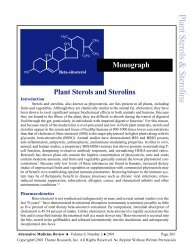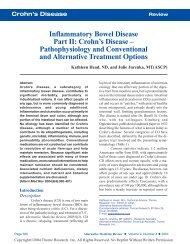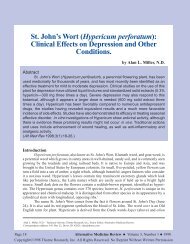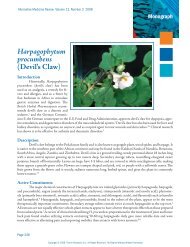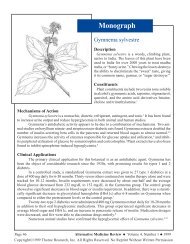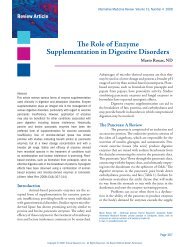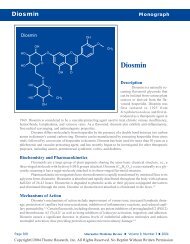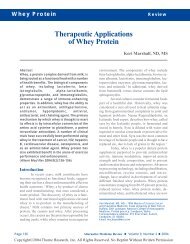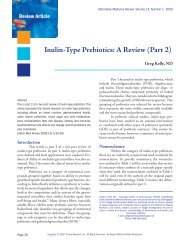Monograph - Thorne Research
Monograph - Thorne Research
Monograph - Thorne Research
You also want an ePaper? Increase the reach of your titles
YUMPU automatically turns print PDFs into web optimized ePapers that Google loves.
Ginkgo<br />
plasma viscosity. 23 Ginkgo administration might improve the clinical outcome following cardiopulmonary<br />
bypass by limiting oxidative stress. 24<br />
3) Cerebral vascular insufficiency and impaired cerebral performance: 25-26 Administration of Ginkgo biloba<br />
extracts has been shown to improve a variety of conditions associated with cerebral insufficiency, including<br />
visual field disturbances associated with chronic lack of bloodflow, 27 oculomotor and complex choice reaction,<br />
28 vigilance and reaction times, 29 depressive mood, 30 memory and mental performance, 31-32 dizziness, 32<br />
and decreased blood flow. 33<br />
Other therapeutic applications include:<br />
1) Congestive symptoms of premenstrual syndrome: Ginkgo extract was effective for the treatment of the<br />
congestive (particularly breast symptoms) and neuropsychological symptoms of PMS, 34 and in the alleviation<br />
of idiopathic cyclic oedema. 35<br />
2) Diabetes: Although human clinical trials have not been conducted, in experimental models, Ginkgo<br />
biloba extract appears to positively modify some complications associated with diabetes. 36-37<br />
3) Impotence 38<br />
4) Intermittent Claudication 39-40<br />
5) Liver Fibrosis: Ginkgo biloba was shown to be effective in arresting the development of liver fibrosis<br />
associated with chronic hepatitis B. 41<br />
6) Macular degeneration: In spite of the small population sample, a statistically significant improvement in<br />
long distance visual acuity was observed in patients with macular degeneration after treatment with Ginkgo<br />
biloba extract. 42<br />
7) Tinnitus: Studies have shown contradictory results in the treatment of tinnitus, which might be due to the<br />
diverse etiology of this condition. 43-46<br />
8) Vertigo/Equilibrium Disorders 47-48<br />
Dosage<br />
Generally recommended daily dosage is 40-80 mg of standardized extract two to three times daily.<br />
120-160 mg of the standardized extract bid or tid. Recommended dosage for Alzheimer’s Disease is at the<br />
higher end of this range or around 240 mg daily. In chronic conditions the extract should be administered for<br />
at least 6-8 weeks before evaluation of efficacy.<br />
Contraindications<br />
Ginkgo biloba should be avoided in patients with known hypersensitivity to the plant. The use of<br />
Ginkgo preparations during pregnancy and lactation has not been studied in humans.<br />
Side Effects<br />
Side effects are uncommon; however, gastrointestinal disturbances (nausea, vomiting, increased<br />
salivation, loss of appetite), headaches, dizziness, tinnitus, peripheral visual shimmering and hypersensitivity<br />
reactions, such as skin rash, have been reported to occur in some individuals.<br />
Drug/Nutrient Interactions<br />
The combined use of aspirin and Ginkgo biloba extracts has been reported to cause subdural hematomas<br />
in some individuals. 49 Although the bleeding has resolved after discontinuation of the Ginkgo<br />
biloba extract, this combination, or the use of Ginkgo biloba extract with other blood thinners should be<br />
avoided, or, if used, done with caution. 49 At least one case of retinal hemorrhage associated with Ginkgo and<br />
aspirin use has been reported.<br />
Alternative Medicine Review ◆ Volume 3, Number 1 ◆ 1998 Page 55<br />
Copyright©1998 <strong>Thorne</strong> <strong>Research</strong>, Inc. All Rights Reserved. No Reprint Without Written Permission



